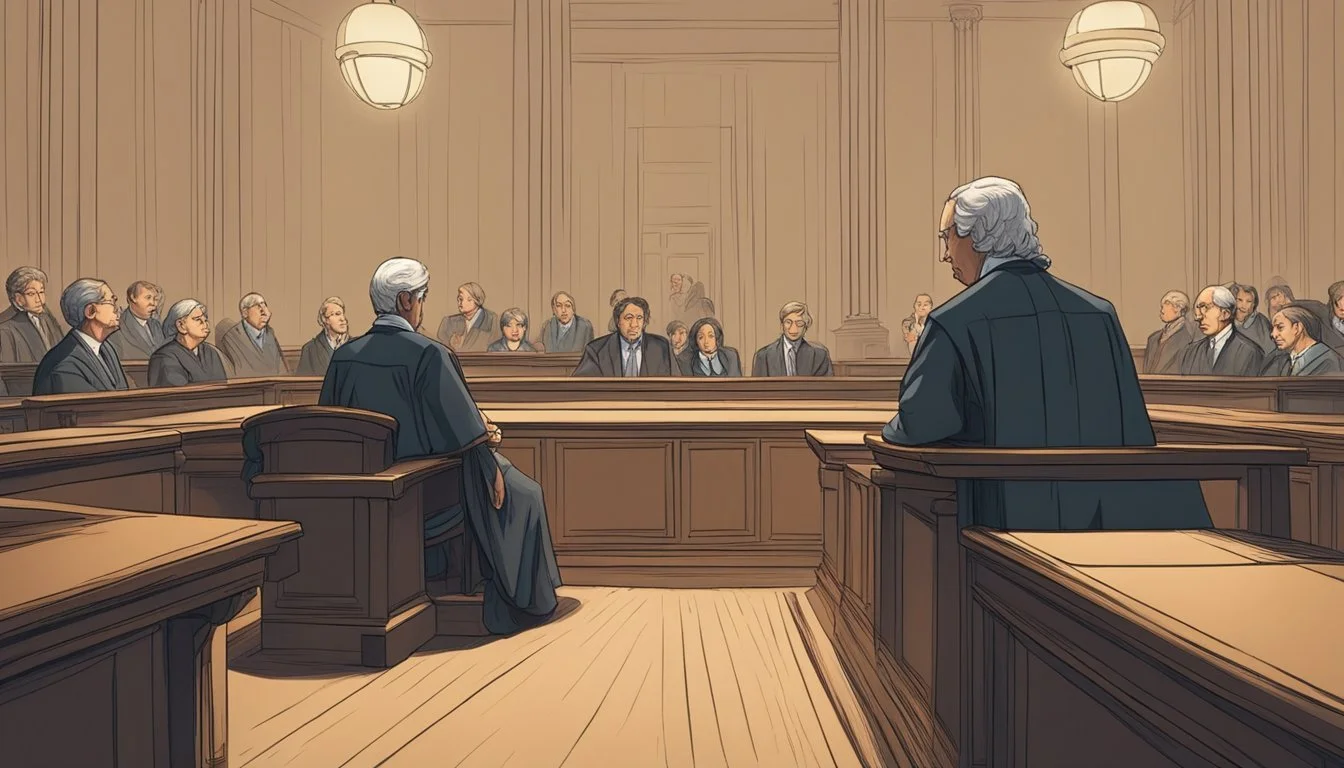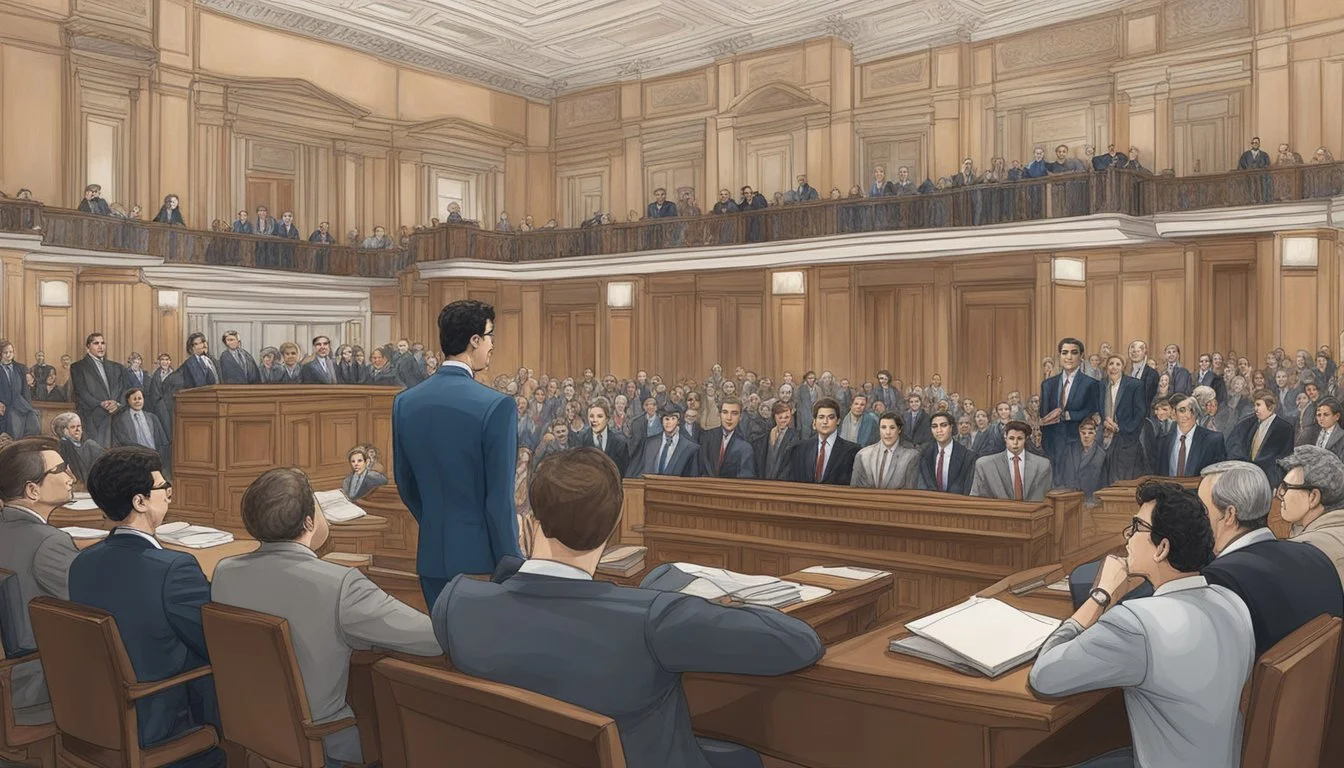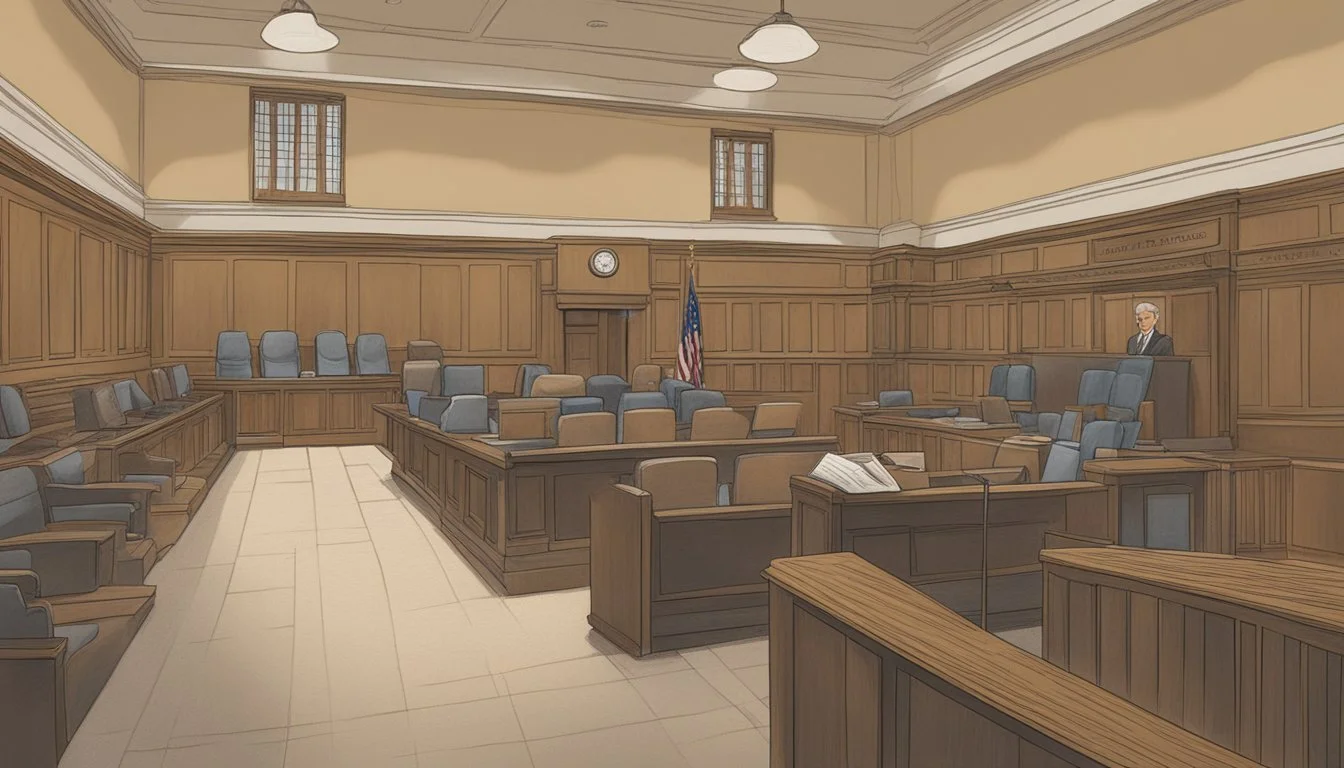Behind the Lens: Crafting the Menendez Brothers' Story for a New Generation
Revisiting a Notorious Case for Modern Audiences
The Menendez brothers' case has captivated audiences for decades, but recent developments have sparked renewed interest and debate. Erik and Lyle Menendez, convicted of murdering their parents in 1989, are now at the center of a cultural reassessment. New documentaries and dramatizations are shedding light on previously overlooked aspects of their story, prompting a reevaluation of the brothers' guilt and motivations.
True crime storytelling has emerged as a powerful force in shaping public perception of past cases. The Netflix series "Monsters: Lyle and Erik Menendez Story" and the documentary "The Menendez Brothers" have played crucial roles in bringing the case back into the spotlight. These productions offer fresh perspectives on the brothers' claims of abuse and the complexities surrounding their trial.
The impact of these new portrayals extends beyond entertainment. In October 2024, the Los Angeles County district attorney announced a review of what he described as new evidence related to the brothers' allegations of molestation. This development underscores the potential for media narratives to influence real-world legal proceedings and public opinion.
The Menendez Brothers: A Profile
Lyle and Erik Menendez shocked the nation with the brutal murder of their parents in 1989. Their case became a media sensation, sparking debates about wealth, abuse, and justice.
Early Life and Family
Jose and Kitty Menendez raised their sons Lyle and Erik in an affluent Beverly Hills household. Jose, a successful entertainment executive, pushed his children to excel. Kitty, a former beauty queen, struggled with substance abuse issues.
The brothers attended elite private schools and enjoyed a privileged lifestyle. Lyle enrolled at Princeton University, while Erik pursued a tennis career. Despite their outward success, the family harbored dark secrets.
Reports suggest the brothers endured years of physical, emotional, and sexual abuse at the hands of their father. This traumatic upbringing would later play a crucial role in their defense strategy.
The Night of the Murder
On August 20, 1989, Lyle (21) and Erik (18) carried out a shocking act of violence. They entered the family room of their Beverly Hills mansion, where Jose and Kitty were watching television.
Armed with shotguns, the brothers unleashed a barrage of shots. Jose died instantly from a point-blank blast to the back of the head. Kitty, attempting to flee, was shot multiple times.
The brothers initially claimed they were not home during the killings. They went on a lavish spending spree in the months following, raising suspicions. Police arrested Lyle in March 1990, with Erik surrendering days later.
Their trial captivated the nation, revealing a complex tale of family dysfunction and alleged abuse.
The Trial That Shocked Beverly Hills
The Menendez brothers' trial captivated the nation, unfolding in the affluent enclave of Beverly Hills. It combined elements of family tragedy, alleged abuse, and courtroom drama that gripped public attention.
Media Frenzy
Television cameras broadcast the trial live, turning it into a national spectacle. Reporters swarmed the courthouse daily, eager for any new developments. The case dominated headlines and talk shows, with pundits debating every aspect of the proceedings.
Lyle and Erik Menendez became household names overnight. Their designer suits and emotional testimonies drew both sympathy and scrutiny from viewers. The public's fascination with the wealthy family's dark secrets fueled intense media coverage.
The Legal Battle: Prosecution vs. Defense
Prosecutors painted the brothers as cold-blooded killers motivated by greed. They presented evidence of the brothers' lavish spending spree after the murders. The brutal nature of the crime - their parents shot multiple times at close range - was emphasized.
The defense team argued self-defense, claiming years of sexual and emotional abuse. They brought in experts to testify about the psychological effects of long-term abuse. The brothers' tearful accounts on the stand became pivotal moments in the trial.
Both sides called numerous witnesses and presented conflicting narratives. The courtroom became a battleground of competing psychologists, forensic experts, and character witnesses.
The Verdict and Aftermath
After two hung juries, a third trial finally reached a verdict. Both brothers were convicted of first-degree murder in 1996. The jury rejected their abuse claims and self-defense argument.
Lyle and Erik Menendez were sentenced to life in prison without the possibility of parole. The verdict brought closure to a case that had stretched on for years, but debates about its fairness continued.
The trial's impact extended beyond the courtroom. It sparked discussions about family violence, media influence on justice, and the role of wealth in high-profile cases. The Menendez brothers remain in prison today, their story continuing to fascinate new generations.
Unearthing New Evidence
Recent developments have brought the Menendez brothers' case back into the spotlight. New evidence has emerged, prompting a reevaluation of their convictions and potential grounds for appeal.
Claims of Abuse
Erik and Lyle Menendez, convicted of murdering their parents in 1989, have long claimed they acted in self-defense due to years of abuse. The Los Angeles District Attorney's office is now reviewing fresh evidence that may support these allegations.
This new information includes previously undisclosed testimony and documents that could corroborate the brothers' accounts of sexual and emotional abuse at the hands of their father. Some supporters argue this evidence was improperly excluded from the original trial.
The DA's review aims to determine if this information warrants a reconsideration of the case or potentially a new trial.
The Push for Retrial
A growing movement, fueled by social media, is advocating for the Menendez brothers' release. Supporters argue that modern understanding of trauma and abuse should be applied to their case.
The brothers' legal team has filed motions to vacate their life sentences based on the new evidence. They contend that if jurors had access to this information, it might have influenced the verdict.
Critics argue that reopening the case could set a dangerous precedent. However, proponents maintain that justice requires a thorough examination of all available evidence, even decades after conviction.
The Cultural Impact and Retellings
The Menendez brothers' case captivated public attention and left a lasting imprint on American culture. It spawned numerous media adaptations and sparked ongoing debates about wealth, family dynamics, and the justice system.
Influence on Media and Society
The Menendez murders became a cultural touchstone, inspiring countless books, TV shows, and documentaries. True crime enthusiasts and legal experts alike have dissected the case for decades. The brothers' trial, televised on Court TV, drew massive viewership and helped popularize the true crime genre.
Social media has reignited interest in the case, with younger generations discovering and debating its complexities. The story continues to provoke discussions about abuse, family secrets, and the nature of justice.
From News to Netflix: Adapting the Story
Netflix has played a significant role in bringing the Menendez case to a new generation. The streaming platform's documentary "The Menendez Brothers" offers a fresh perspective, allowing Lyle and Erik to share their story directly.
"Monsters: The Lyle and Erik Menendez Story" reimagines the case for dramatic television. This adaptation joins a long list of retellings, each offering its own interpretation of events.
These productions reflect an ongoing fascination with the case and its ability to resonate with audiences across decades.
Connections to Prominent Figures
The Menendez brothers' case has attracted attention from celebrities and criminal justice advocates, leading to renewed public interest and calls for reevaluation.
Celebrity Interests in the Case
Kim Kardashian, a prominent figure in prison reform advocacy, has shown interest in the Menendez brothers' case. She has used her platform to raise awareness about their situation and the complexities surrounding their trial. Kardashian's involvement has brought renewed attention to the case, particularly among younger audiences who may not have been familiar with it previously.
Other celebrities have also expressed support or curiosity about the case. This celebrity interest has helped keep the Menendez brothers in the public eye decades after their conviction.
Advocacy and the Public Eye
Criminal justice advocates have taken up the Menendez brothers' cause, arguing for a reexamination of their case. These advocates highlight issues such as childhood trauma and abuse as factors that should be considered in understanding the brothers' actions.
George Gascón, Los Angeles County District Attorney, has faced calls to review the case. Prison reform advocates have pointed to the Menendez case as an example of the need for systemic changes in the criminal justice system.
The advocacy efforts have led to increased media coverage and public discussions about the case. This renewed interest has sparked debates about justice, rehabilitation, and the long-term impacts of childhood trauma.
Behind the Scenes of the Documentary
The creation of the Menendez brothers documentary involved extensive research, interviews, and meticulous narrative crafting. Key figures like Ryan Murphy and Alejandro Hartmann played crucial roles in bringing this complex story to life for a new generation of viewers.
Interviewing the Menendez Brothers
Ryan Murphy secured exclusive audio interviews with Erik and Lyle Menendez from prison. These conversations provided intimate insights into the brothers' perspectives decades after the murders.
The production team faced unique challenges in conducting these interviews. They navigated strict prison protocols and time constraints while aiming to capture authentic, unguarded moments.
Alejandro Hartmann, the director, employed specialized audio equipment to ensure clear recordings within the prison environment. The team carefully prepared questions to elicit meaningful responses without re-traumatizing the subjects.
Crafting the Narrative
The documentary's narrative structure emerged through a meticulous process of sifting through vast amounts of material. Hartmann and his team reviewed hours of trial footage, news archives, and the newly recorded interviews.
They focused on presenting a balanced account, incorporating perspectives from prosecutors, defense attorneys, and family members. The narrative aimed to contextualize the crime within the broader societal issues of the time.
Editors worked closely with Murphy to weave together archival footage, reenactments, and interview segments. They employed innovative visual techniques to maintain viewer engagement while presenting complex legal and psychological concepts.
The team made careful decisions about which aspects of the case to highlight, aiming to shed new light on the story for both those familiar with it and newcomers.
Reflecting on the Moral Questions
The Menendez brothers' case raises complex moral and ethical questions about justice, abuse, and the nature of evil. It challenges our understanding of right and wrong in difficult circumstances.
The Concept of Monsters
The label "monster" often oversimplifies complex human beings and their actions. In the Menendez case, this term fails to capture the nuanced reality of two young men who committed a horrific crime after allegedly enduring years of abuse. Their story forces us to confront uncomfortable truths about human nature and the capacity for violence.
The Netflix series title "Monsters" invites viewers to question this designation. Were Lyle and Erik Menendez truly monsters, or victims who became perpetrators? This framing encourages audiences to look beyond sensationalism and consider the factors that led to the tragic events.
Moral judgments become challenging when abuse is involved. The brothers' claims of molestation add layers of complexity to their actions. While murder is unjustifiable, understanding the context forces us to grapple with difficult questions of culpability and justice.
The Menendez Legacy
The Menendez brothers' case left an indelible mark on the American justice system and public consciousness. Their story continues to evolve, shaping discussions on criminal justice and rehabilitation.
Life After the Verdict
Lyle and Erik Menendez were sentenced to life in prison without the possibility of parole in 1996. They were initially held in separate facilities but were reunited at Richard J. Donovan Correctional Facility in San Diego in 2018 after years apart.
The brothers have adapted to prison life, participating in various programs and activities. Lyle has been involved in educational initiatives, while Erik has focused on art and writing. Both have maintained relationships with family members and supporters through visits and correspondence.
Their case has gained renewed interest from younger generations through social media platforms, leading to debates about their guilt and sentencing.
Prison Reform and Advocacy
The Menendez brothers' experience has shed light on issues within the California Department of Corrections and Rehabilitation. Their supporters have used their case to advocate for prison reform, focusing on rehabilitation programs and mental health services for inmates.
Lyle and Erik have become vocal about prison conditions and the need for systemic changes. They have participated in interviews and documentaries, sharing their perspectives on the justice system and their personal growth while incarcerated.
Their story has sparked discussions about juvenile offenders, life sentences, and the potential for rehabilitation. Some advocates argue that their case exemplifies the need for more nuanced approaches to sentencing and incarceration.
Revisiting the Menudo Connection
The Menendez brothers case took an unexpected turn with claims from a former Menudo member. Roy Rosselló, who performed in the popular Latin boy band, alleged a disturbing connection to José Menendez.
Rosselló's accusations brought new attention to the decades-old case. He claimed José Menendez had sexually abused him during his time with Menudo, adding another layer to the complex narrative surrounding the murders.
This revelation emerged in recent documentaries exploring the Menendez brothers' story. "Menendez + Menudo: Boys Betrayed" on Peacock and Netflix's "Monsters: The Lyle and Erik Menendez Story" both examined these allegations.
The connection between Menudo and the Menendez case highlights the far-reaching impact of the brothers' story. It demonstrates how the case continues to evolve, even decades after the initial trial.
Menudo, known for launching careers like Ricky Martin's, now finds itself linked to one of the most infamous criminal cases of the 1990s. This unexpected intersection of pop culture and true crime has reignited public interest in the Menendez brothers' case.
The allegations raise questions about potential patterns of abuse and their influence on the brothers' actions. They also underscore the complexities involved in revisiting high-profile cases with fresh perspectives and new information.










